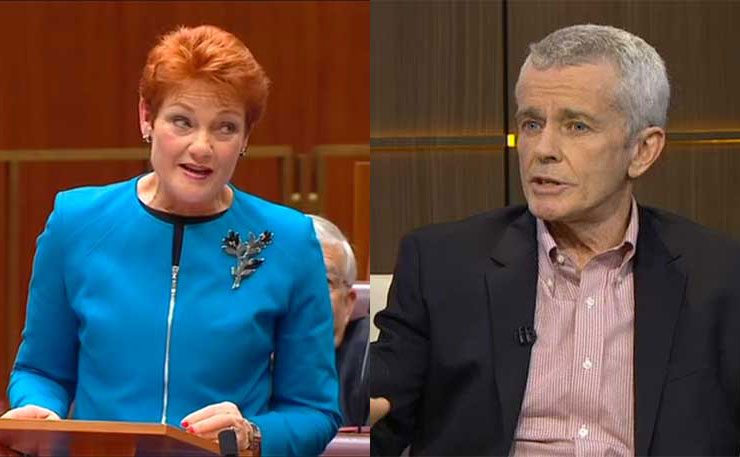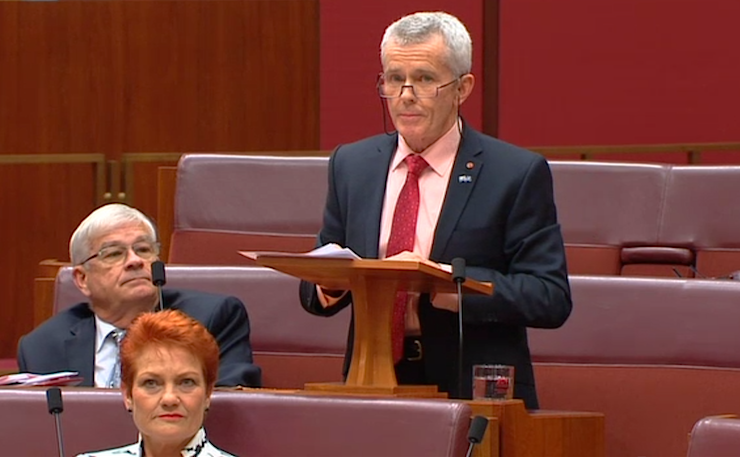One Nation Senator Malcolm Roberts was a British citizen when he was elected to Australian Parliament. So says the High Court. Managing Partner of Marque Lawyers, Michael Bradley explains how it happened, and why it’s all so ridiculous.
Back in April 2016, Malcolm Roberts BE (Hons), MBA (Chicago), Fellow AICD, MAIM, MAusIMM, MIMM (UK), Fellow ASQ (USA, Aust), signed off on one of his many letters explaining why climate change is not real, to a Turnbull Government minister.
Explaining how deluded the then Environment Minister Greg Hunt was regarding climate science, Roberts wrote that “there is no empirical evidence showing human cause of climate variability”. However, “after I repeatedly proved this [Hunt] continues to state or imply his ‘belief’ in human cause. When held accountable he resorts to common excuses and myths as ‘justification’ for his ‘belief’. Belief is the hallmark of religion being faith-based not science that is data-driven.”
Eighteen months later, One Nation Senator Malcolm Roberts swore an affidavit in the High Court justifying his personal belief that he did not breach section 44(i) of the Australian Constitution when nominating for election as a Senator last year.
The plain legal fact is that, at that time, Roberts was a citizen of both Australian and the United Kingdom. He was born in India and, at birth, was registered as a citizen of the “UK and Colonies”. Justice Keane, in the High Court sitting as the Court of Disputed Returns, recorded this in his judgment on Friday:
As to the issue of possible British citizenship, Senator Roberts said that he reflected on his childhood memories. He recalled that his father never called him British, and said that given his “pleasantly sarcastic” nature, his father would have gently teased him about being British had his father thought that to be the case. He said that because of this he never suspected that he might be British.
That doesn’t sound all that empirical to me. Let’s explore some actual facts.
Roberts was born in 1955 in India, where his Welsh father and Australian mother were then living. The family moved to Australia in 1962, Roberts travelling on his mother’s passport which was endorsed that Roberts was “a British subject by birth but has not acquired Australian citizenship”.
Roberts applied for Australian citizenship in 1974. It follows, empirically, that he had not been an Australian citizen for the preceding 19 years and therefore must have been a citizen of somewhere else. In the High Court, he suggested that he’d thought he was “stateless”, an extraordinary thing for an anti-immigration politician to say, and patently untrue.
In his citizenship application, which Roberts said he didn’t read before signing (because why would a scientific empiricist ever do that?), Roberts stated that he was a British citizen. Awkward.

In 2016, after Pauline Hanson had carefully pre-selected Roberts for One Nation, Roberts turned his mind to the requirements of section 44(i) and its prohibition on foreign citizens being elected to Federal Parliament.
Roberts was sure he was not a foreigner, but decided to be “totally certain” and sent three emails to incorrect addresses for the British Consulate with the subject line “Am I still a British citizen?” Presumably that was a rhetorical question, because Roberts knew the empirical truth already.
No reply had been received by the time Roberts lodged his nomination. A few months later, Roberts’ wife became concerned about his status. Finally making actual contact with the UK High Commission in September 2016, Roberts ultimately followed the correct procedure for renouncing his UK citizenship. As Keane J found, the renunciation took effect on 5 December, well after Roberts had been elected with 77 primary votes.
So, how did Roberts go in the witness box as he sought to reconcile some obviously contradictory matters? Specifically, his stated belief that he has always been solely “Australian”, as against the empirical fact that he spent the first 19 years of his life not being Australian, the empirical fact that documentary records identified him as a UK citizen, and the empirical fact that he was sufficiently concerned to ask the UK authorities in 2016 whether he was still a citizen.
Keane J found that “Nothing in Senator Roberts’ demeanour during the course of his cross-examination led me to doubt the sincerity with which Senator Roberts sought to defend his position”.
However:
“Senator Roberts ‘position’ was not supported in any significant particular by any documentation contemporaneous with critical events, and his attempts to reconcile statements made by him in documents that he either wrote or signed with his own evidence to contrary effect were speculative or unrealistic. I am not prepared to accept Senator Roberts’ subjective appreciation of the effect of his own documents where that appreciation is contrary to an objective understanding of the words used. Similarly, I am not prepared to act upon the subjective appreciation of events in his life by which he seeks to challenge an objective view of the significance of those events.”
Roberts’ “position” came down to this: “I considered myself Australian and only Australian. This is my sincere belief based upon having grown up in Australia.”
As Keane J noted, “Senator Roberts equates feelings of Australian self-identification with citizenship”. But Roberts, “as tenaciously as he contended for this highly subjective (and objectively untenable) view of things, was unable to maintain this position.”
Ultimately, Keane J concluded that “the difficulties in his position… test credulity too far to accept his evidence that he was not a British citizen at the date of his nomination.”
The factual findings made by Keane J are devastating for Roberts’ case, which the High Court will determine along with those of the other section 44 victims in October. Keane J found as (empirical) facts that Roberts knew he did not become an Australian citizen until 1974, and he knew there was at least a real and substantial prospect that he was still a UK citizen when he nominated.
Further, there were numerous steps Roberts could have taken to confirm his legal status and effectively renounce his UK citizenship. The emails he sent were not effective for that purpose.
The High Court has previously set a test for eligibility under section 44(i). If a candidate is a foreign citizen, they may still be eligible despite the literal words of the section. To get past the problem, they need to have taken reasonable steps to attempt to renounce their foreign citizenship. What is reasonable depends on the particular circumstances.
Keane J was determining only the facts, not whether what Roberts did was sufficient to rescue him from section 44(i). That’s yet to be decided. However, it’s not much of a gamble to predict that he’s going to go down like the Hindenburg.
We’ll leave it to Roberts to pass judgment on himself: “When held accountable he resorts to common excuses and myths as ‘justification’ for his ‘belief’. Belief is the hallmark of religion being faith-based not science that is data-driven.”
Donate To New Matilda
New Matilda is a small, independent media outlet. We survive through reader contributions, and never losing a lawsuit. If you got something from this article, giving something back helps us to continue speaking truth to power. Every little bit counts.






